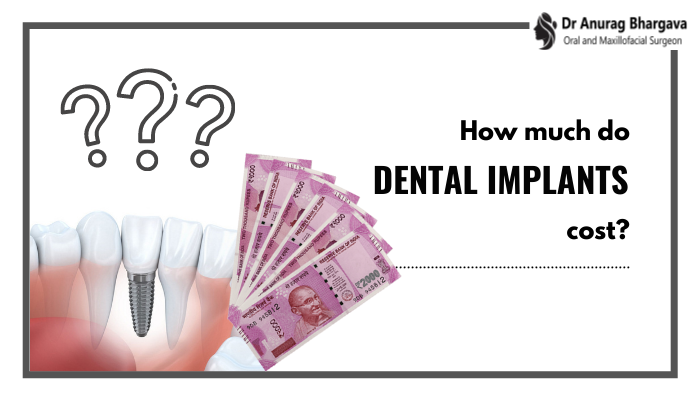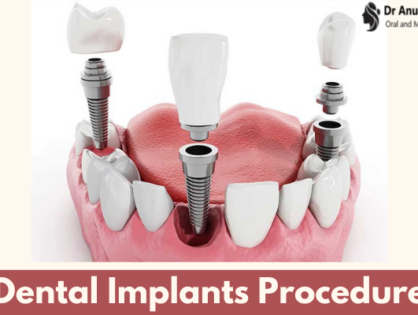A dental implant is a popular technique in the field of dentistry. It is the best method to replace a single missing tooth or multiple missing teeth. People are bothered about the cost of the technique. The cost of the dental implants in India may be higher than that of the bridge. But it has several advantages and long-term cost recovery.
If you have missed a tooth, or have considered dental implants, this information may be helpful to you if you consider the implant to be an expensive treatment.
How much does a Dental Implant Cost for One Tooth?
A single implant with its cap/crown would cost around 20,000 to 50,000 depending on the type and company of dental implants in India. As such a bridge would cost about 9000 to 30,000 depending on the type of material like PFM/Zirconia/Emax/Titanium. Moreover, your two natural asymptomatic teeth close to the missing tooth will be cut.
An implant will be functioning for 10 years like another tooth. A small cleaning job around the implant may be needed as you may with any other tooth. However, the average lifespan of the bridge is 8-10 years. Further replacement would cost Rs. 12,000 to 40,000. The cost is higher because sometimes we might need to make a longer bridge if bone loss has occurred around the supporting teeth. So, over 10 years the bridge will cost between 21000 – 70000 which is more than equal to the cost of the dental implants in India.
Types of Dental Implants
1. Immediate Loading Dental Implants
Immediate loading implant might be less expensive and the treatment is also faster. The cost of immediate loading implants is 40000 INR including crown.
2. Bone Strength and Density
As dental implants are integrated into your bone, your bone strength must be satisfactory. That is the reason it is required to do imaging scans which shows the condition of your bone and jaw structure. This is essential since it weighs into the cost of your dental treatment.
3. Standard Dental Implant
A standard 2-stage dental implant is a long process that includes the insertion of the dental implant during the initial period. Around 3 months is required for the implant to blend with the existing natural bone. In the second stage, the crown is fixed on top of the implant.
In rare cases, if there is no proper bone present to hold the implant, then you might need a bone graft. This graft help in bone development over some time. This will increase your cost as well as time for treatment.
Factors of Dental Implant Cost
Certain factors affect the cost of the dental implant. Oral and maxillofacial surgeons like Dr. Anurag Bhargava will give an overview of the cost of dental implant.
1. Material – The material used in the implant can affect the cost. The cost is determined by the quality of the material to be used. The commonly used material is titanium. This is durable and long-lasting.
2. Teeth Replacement - The greater the number of teeth to be replaced, the more the cost of dental implant will be. The cost is billed on a per tooth basis which gives a rough idea of how they get the total.
3. Insurance – This kind of surgery is covered by some health insurance. In certain insurance, you get 100% coverage which means zero cost on dental implant with insurance which saves you from spending any amount.
4. Surgery Before Implant – Some patients require other surgeries before the implant procedure. This is decided after consultation. Bone grafting and sinus lift are common surgeries to obtain a larger area where the implant can be placed.
Depending on specific conditions and history, there is a range of options for you to choose from.
Process of Dental Implant
Osseointegration is a process where the bone cells get interlocked to the surface of titanium dental implants resulting in the fusion between your bone and the dental implant.
A single dental implant requires about 30-60 minutes.
Stages Of Dental Implant
Before going for dental implant, oral and maxillofacial surgeons like Dr. Anurag Bhargava will explain to you the stages of dental implant.
The dental implant is executed under local anesthesia. The doctor drills a hole into the bone and widens it to fix the dental implant. It takes 3-6 months for the implant to take place. During this time temporary bridges may be used to reduce chewing inconvenience.
Prosthetic Procedure
Evaluation of bone surrounding the implant following which new tooth can be placed to the anchored implant in your jaw.
The success of Dental Implant
The truth about Dental Implant is that it has a success rate of 92 - 98%. With skillful oral and maxillofacial surgeons like Dr. Anurag Bhargava success is surely guaranteed.
Advanced Imaging Techniques
The field of dental implants has seen significant technological advancements, particularly in imaging techniques that have revolutionized the way implants are planned and executed. One of the most noteworthy innovations is the use of 3D Cone Beam Computed Tomography (CBCT) scans. Unlike traditional 2D X-rays, 3D CBCT scans provide a three-dimensional view of the patient’s oral and facial structures. This detailed imagery allows oral and maxillofacial surgeons to assess bone density, nerve positioning, and the overall jaw structure with unprecedented accuracy.
This advanced imaging technology ensures that the implant is placed in the optimal position, minimizing the risk of complications such as nerve damage or sinus perforation. Additionally, the 3D CBCT scan aids in creating a precise treatment plan tailored to the unique anatomy of each patient. By visualizing the exact placement of the implant, surgeons can achieve better alignment and integration with the natural bone, ultimately leading to improved long-term success rates and patient outcomes.
Digital Dentistry
Another leap forward in dental implantology is the integration of digital dentistry into the implant process. Digital impressions, taken using intraoral scanners, have replaced the traditional, often uncomfortable, putty-based impressions. These digital scans are highly accurate and can capture the detailed anatomy of the patient’s mouth in a matter of minutes. The data from these scans is used to create a virtual model of the patient’s teeth and gums, allowing for precise planning of the implant procedure.
Computer-guided surgery is another facet of digital dentistry that has transformed the implant process. By utilizing the data from 3D CBCT scans and digital impressions, surgeons can use specialized software to plan the exact placement of the implant before the actual surgery. This technology allows for the creation of a surgical guide, a custom-made template that ensures the implant is placed in the exact location as planned.
This approach makes the procedure more efficient and less invasive, reducing the overall surgery time and improving patient comfort. The precision of computer-guided surgery also enhances the implant's integration with the bone, leading to faster healing times and higher success rates. Moreover, these technological advancements can affect the overall cost of the procedure, as they reduce the likelihood of complications and the need for corrective surgeries, making dental implants a more reliable and long-lasting solution for tooth replacement.



